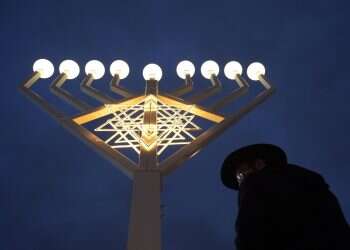Hundreds of millions of soccer fans across the globe are fixing their collective gaze on the World Cup in Moscow. This tournament, though, is more than just sport. First and foremost, this is a cynical, calculated political game, and only then do we get around 90 minutes of utter enjoyment on the field.
The decision to hold the tournament in Moscow is a political statement. Putin's Russia is sparing no cost to leverage the event, to show its citizens and the world its power. This time, unlike the Moscow Olympics in 1980, European countries and the United States didn't boycott the competition, despite Russia's invasion of Ukraine and occupation of Crimea. After all, when it comes to the Russians it's best not to quarrel.
The next World Cup in 2022 will be played in Qatar, just about the last place one thinks about when talking about soccer. This desert kingdom spent tens of millions of dollars, at least, to bribe the decision-makers at FIFA, soccer's world governing body, to secure the delusional approval to host the tournament on its soil. Qatar announced it would even allow Israeli fans to attend.
In the meantime, Qatar's newfound spirit of sportsmanship was recently on display with its support, encouragement and cash for the Palestinian campaign of pressure on the Argentinean national team to cancel its friendly match against the Israeli team in Jerusalem. It also supports the browbeating politico Jibril Rajoub – formerly of the Palestinian Authority security apparatus and another paragon of sportsmanship in his own right, to push for Israel's expulsion from FIFA and to boycott it. But the truth is that hosting the tournament is important to Qatar mostly to anger its older brother, Saudi Arabia, with whom it is mired in an ongoing diplomatic row.
The fight to host the World Cup in 2026 also claimed victims. This time it was Morocco, which lost the deciding vote to North America. Several Arab countries, chief among them Saudi Arabia, abstained from supporting Morocco in what has become a matter of national pride for Moroccans. Rabat's response was quick to follow.
Meanwhile, the Saudis are celebrating their participation in this World Cup, alongside Egypt, Tunisia, Morocco and even Iran – quite a respectable representation from our region. The Saudis opened the tournament with a 5-0 trouncing at the hands, or feet, of the Russian team. However, for Saudi Crown Prince Mohammed bin Salman – who flew to the opening ceremony in Moscow during the Muslim holy month of Ramadan at the invitation of Vladimir Putin – just taking part in the World Cup is an achievement that puts his country on the world map.
The Egyptian team also punched its ticket to Moscow, this time with relative ease; although it has already lost its first match 1-0 to Uruguay. In 2010, when Egypt failed to qualify for the World Cup in South Africa, it faced Algeria in the go-in game and the battle – literally and figuratively – between the players on the field and the fans who rumbled in the streets almost caused the countries to sever their diplomatic ties. The Algerian team was defeated in Cairo after its players were assaulted and beaten on their way to the stadium by Egyptian fans; but the return match held in Khartoum, Sudan was won by the Algerians to secure their spot in the tournament.
It appears though that the challenge facing the Arab squads doesn't pertain to sport or even politics, but rather to religion. Some of the qualifying matches were played during Ramadan, which sparked heated religious debates: Are players permitted to break the Ramadan fast (which includes liquids)? Clerics in Egypt and Saudi Arabia rallied to issue religious rulings allowing the players to break the fast, for the sake of victory in the sporting battle. Some clerics went as far as to permit the manager and his assistant coaches, and even the fans, to break the fast. On the other hand, many other religious scholars, mainly those without affiliations to the government establishments, decried the sacrilege. In some of the cases, with the Egyptian team, for example, the players came out against the permission and demonstratively fasted.



